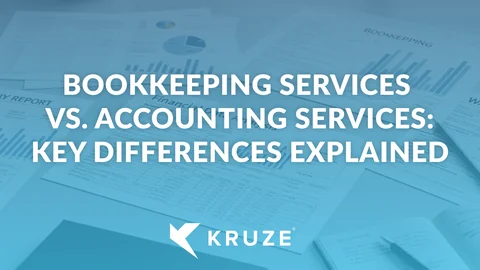
What’s the difference between bookkeeping services and accounting services? A lot of founders ask this question, so let’s take a look at both areas. Though both services are essential to a business’s financial health, the responsibilities, skills required, and scope are distinct – and understanding those distinctions is crucial for startups aiming for fast, compliant growth.
Bookkeeping Services: Mastering Daily Transactions
Bookkeeping services manage the day-to-day financial transactions and record-keeping within a company. The main responsibilities that fall under this area include:
- Recording and categorizing everyday financial transactions
- Managing accounts payable and receivable
- Reconciling bank statements
- Processing payroll
- Maintaining, updating, and balancing the general ledger
Bookkeepers keep your business’s financial records are accurate and up-to-date, providing the foundation for all higher-level financial management.
Skilled bookkeeping services make sure every transaction is recorded promptly and correctly, enabling startup founders to monitor cash flow, make informed decisions, and maintain compliance with tax regulations. With reliable, organized records, you’ll have the financial transparency needed to secure investor funding, avoid costly errors, and confidently plan for the company’s future.
Accounting Services: Strategic Advice and Analysis
Accounting services build on the information maintained by bookkeepers, offering higher-level analysis and strategic oversight. Core accounting service responsibilities include:
- Reviewing and interpreting financial records
- Preparing and analyzing financial statements
- Offering tax planning and filing services
- Providing strategic financial advice and forecasting
- Ensuring legal and regulatory compliance
- Advising on big-picture financial decisions
Accountants help founders understand what the numbers mean for the health of their startups and their future plans, delivering insights that inform growth and mitigate risk.
Relying on accounting services to provide financial analysis and insight is invaluable as your startup grows and becomes more complex. By interpreting financial data, preparing comprehensive reports, and forecasting future trends, an accountant helps founders understand the company’s financial strengths and weaknesses, enabling smarter decisions about budgeting, fundraising, and long-term strategy. This expert analysis uncovers opportunities for better cash flow, cost savings, and profitable growth, while also ensuring regulatory compliance and building credibility with investors and other stakeholders.
Why Startups Need Both
While bookkeeping services maintain clear and accurate records of daily transactions, accounting services use that data to guide founders on everything from investor readiness to tax strategy. Reliable bookkeeping is the basis for great accounting. Both are critical for venture-funded startups aiming to build credibility with investors and make data-driven decisions for sustainable success.
In summary:
- Bookkeeping services manage the transactional, daily details.
- Accounting services provide big-picture analysis, planning, and compliance.
The collaboration between bookkeepers and accountants keeps startups organized, audit-ready, and strategically poised for growth. For help with either – or both – Kruze Consulting offers specialized services tailored for venture-funded startups.












